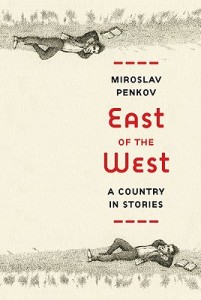 Bulgarian-American author Miroslav Penkov’s debut short story collection, East of the West (Farrar, Straus & Giroux), comes at a time when his native country’s literary star is on the rise in the west. Fiction writers like Georgi Gospodinov, Kapka Kassabova, and Vladislav Todorov have made a splash, and the efforts of the Elizabeth Kostova Foundation—which developed the Sozopol Fiction Seminars, previously discussed here on FWR—have helped build international awareness for this small but vibrant literary community. The iconic literary magazine Granta has recently begun a cooperative agreement to publish a Bulgarian version. Penkov differs from his fellows in that he writes in English and has made his nest in America, where he earned his MFA at the University of Arkansas and now teaches at the University of North Texas. East of the West has garnered significant critical attention, including a guest spot on NPR’s All Things Considered.
Bulgarian-American author Miroslav Penkov’s debut short story collection, East of the West (Farrar, Straus & Giroux), comes at a time when his native country’s literary star is on the rise in the west. Fiction writers like Georgi Gospodinov, Kapka Kassabova, and Vladislav Todorov have made a splash, and the efforts of the Elizabeth Kostova Foundation—which developed the Sozopol Fiction Seminars, previously discussed here on FWR—have helped build international awareness for this small but vibrant literary community. The iconic literary magazine Granta has recently begun a cooperative agreement to publish a Bulgarian version. Penkov differs from his fellows in that he writes in English and has made his nest in America, where he earned his MFA at the University of Arkansas and now teaches at the University of North Texas. East of the West has garnered significant critical attention, including a guest spot on NPR’s All Things Considered.
In this auspicious moment, Penkov delivers a heck of a book. Its bold subtitle promises us broad cross-sections of Bulgarian society, and he resists commonplace post-Communist sentimentality to show us a broad range of Bulgarian society—older generations who leave themselves behind in the face of change, younger generations that lose their way, people who leave home and come back changed, people who leave home and never come back at all. Penkov gives us specific, intimately drawn glimpses into the various Bulgarian species of this thing we call the human condition, and he does it with a well-honed style that is not merely ornamental.
Since the book’s subtitle invokes a nation and its history, it’s fitting that history plays a key supporting role in Penkov’s dramas, and he finds a variety of ways to invoke that history. The title story, about a man’s failed attempt to reach out to a beloved cousin, unfolds around the Serbian-Croatian conflict at the turn of the millennium. “The Night Horizon” conjures up the ghost of hostility between Bulgaria and Turkey, the nation that occupied it for centuries. “Buying Lenin,” which appeared in The Southern Review and Best American Short Stories 2008, gives us a Bulgarian émigré to America who buys Lenin’s preserved body on eBay for his grandfather back home. “A Picture with Yuki” wades into the problematic relationship between Bulgarians and gypsies.
This variety helps keep East of the West from covering the same ground over and over. Sometimes history remains silent and inscrutable, sometimes it’s an ever-present roadblock that must be danced around, and sometimes it weighs so heavily on people that they significantly limit their life choices. The seventy-one-year-old narrator of “Makedonija,” who has the broadest perspective on Bulgarian history of all the characters in the book, becomes as haunted by old letters from his dying wife’s long-ago first love as he is by his own memories of war.
I’ve seen men with their eyes gouged out. Men close to me, barefooted, with wrists tied together behind their backs. Hanged on the village square for everyone to see. As I lie in bed, eyes shut tightly, I still hear the rope creaking when the bodies sway, and I can hear the sound the bodies make swaying.
History, invoked in this way, metes out ancestral punishment on those who get caught beneath its steamroller by circumstance. In “The Night Horizon,” an obsessive Turkish-bagpipe maker foists a male name (Kemal) onto his daughter so that she can “properly” carry on his family craft. After all Turks are ordered to take Bulgarian names, he is taken away from his home (whether to imprisonment or death we never know) and his daughter takes up his ethno-historical conflict:
Sometimes Kemal took her bagpipe above the village to play with the echo. Once, she saw cars on the road below her, bumper to bumper, with mattresses, chairs, wooden cribs roped to the tops—blue, green, yellow, red cars, blood flowing away from the mountain…. Down the slope she watched people from the upper hamlets haul their households on their backs like camels…. Pots and pans and spoons and ladles and metal plates jumping wildly and catching the sun like gold coins. So Kemal struck her song with the bagpipe…
The characters in East of the West each have their own historical burdens to bear, and individuals—or families, like the one in the title story that gets torn apart because of a daughter’s love for a man across the river in Serbia—can’t carry them for very long. In “Cross Thieves,” which unfolds in 1997 as “once again the government has fallen,” Bulgarian history becomes a kind of currency in itself:
Gogo and I steal things and sell them, mostly to Gramps. We snuck into the biology classroom and took the skull our teacher used for an ashtray. Later Gramps claimed he resold it as an authentic skull from the 1944 Communist uprising…. We’ve stolen coils of copper wire from the physics lab (a Soviet leftover from the ’68 Prague spring), a map of the Balkan Wars (vintage, first edition!) a globe (with the USSR still whole and strong). In Bulgaria today there is a black market for everything, it seems.
In this collection we also see—no surprise for a formerly Marxist country—history manifesting itself as class conflict. In “The Letter,” a girl steals from an older compatriot woman who has learned English and, after marrying a British businessman, basks in relative luxury in a small village. The people identify Missis, as she is called, as being “British” because she has taken on a new identity. “This is how you learn your English,” she tells the young thief. “This is how you marry Mister and live rich.” Class conflict also shows up in “A Picture with Yuki,” in which the phrase “class enemy” is used the traditional Marxist way, as well as in “Devshirmeh,” where a down-and-out emigre to Texas watches his daughter disappear into a higher social class because his ex-wife marries an expat Bulgarian doctor.
In Penkov’s work we see class and history affecting the lives of almost everyone, and the English language often appears, like it does in “The Letter,” as a dividing line. It is part of the complex negotiation with Bulgarian-ness, foreign-ness, and the ever-present issue of social class. The elderly protagonist of “Makedonija” tells us, “I listen to the English and all the words sound like a single word to me, a word devoid of history and meaning, completely free.” The émigré narrator of “Buying Lenin” “memorized words and grammar rules and practiced tongue twisters, specifically designed for Eastern Europeans…. Remember the money, remember the money, remember the money. Phrases like this, I’d heard, helped to break your tongue.”
Perhaps Penkov’s best and most crystalline expression of Bulgarian-ness comes in “Devshiermeh,” the final story in the collection (and, as is often the case with first books, the longest). Émigré narrator Mihail (Americanized, to his annoyance, as Michael even by his Bulgarian ex-wife) takes his daughter Elli for the weekend and goes fishing with a fellow ne’er-do-well friend named John Martin:
“Yad, John Martin,” I explain, “is what lines the insides of every Bulgarian soul. It’s yad that propels us, like a motor, onward. Yad is like envy, but it’s not simply that. It’s like spite, rage, anger, but more elegant, more complicated. It’s like pity for someone, regret for something you did or did not do, for a chance you missed, for an opportunity you squandered. All those feelings in one word. Yad….”
Though yad might not line every Bulgarian soul, it aptly describes the free-floating tension that filters through the psyches of Penkov’s characters. Yad accounts for their endless wrestling with their national identity, so strong that it survives crossing borders and cutting off ties to the past. A great quality of Penkov’s stories is the sudden—but, in retrospect, inevitable—emergence of his characters’ destinies. At their halfway or two-thirds points the stories turn, and around that corner its people fall inextricably into the nest they have made.
 This is expressed most beautifully in “A Picture with Yuki,” in which a Bulgarian/Japanese couple living in Chicago travel to Bulgaria to seek fertility treatments—a return, for the husband, fraught with all the wrestling over foreign-ness and Bulgarian-ness that his yad can handle. During a drive to the country, they may or may not hit a gypsy boy on a bicycle, who later falls into a coma and dies. The boy’s father, not knowing their possible role in this death, asks the couple to take a picture of the dead child for his nekrolog—a death announcement to be posted at the cemetery gates.
This is expressed most beautifully in “A Picture with Yuki,” in which a Bulgarian/Japanese couple living in Chicago travel to Bulgaria to seek fertility treatments—a return, for the husband, fraught with all the wrestling over foreign-ness and Bulgarian-ness that his yad can handle. During a drive to the country, they may or may not hit a gypsy boy on a bicycle, who later falls into a coma and dies. The boy’s father, not knowing their possible role in this death, asks the couple to take a picture of the dead child for his nekrolog—a death announcement to be posted at the cemetery gates.
The gypsies bring the boy outside and prop him up on pillows to take his picture, then invite the couple to stay for dinner. The couple never mentions the bicycle accident, and afterwards the weight of their uncertain guilt threatens to demolish their relationship and rebuild it around what is unspoken. In moments like this, Penkov’s work supersedes the confines of any national literature and presents us as we are—with our worries, with our yad, with our furtive gropings toward meaning—no matter how much we may wish to be some other way.
Further Links & Resources
- Check out other FWR pieces on Bulgarian literature.
- Here’s an interview with Penkov in The Dallas Observer’s book blog.
- Read an archive of Penkov’s work on Blackbird.
- Penkov offers a list of how to write about Bulgaria in GRANTA.





